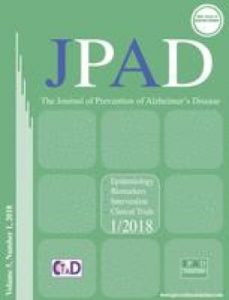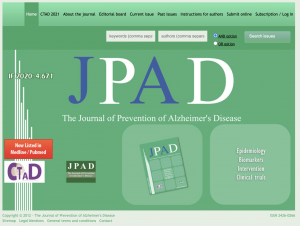
Apologies in advance for the fact that this post is really just for the science publishing completists out there. But we know you’re out there.
Last week, Endpoints News, STAT and a few other outlets reported that Biogen had, in Endpoint’s words, “finally” published the key data behind the approval of Aduhelm by the U.S. FDA – a controversial green light, to say the least. The company had previously withdrawn the manuscript from JAMA because the journal had – gasp! – demanded edits, Axios reported last year.
Critics pointed out that the Journal of Prevention of Alzheimer’s Disease (JPAD) – where the study was eventually published – was a far cry from JAMA, and suggested that the paper was subjected only to peer-review lite.
Then the paper disappeared.
The full text of the article had been posted on a current papers page at JPAD, on top of lots of other recent articles, and without its own metadata such as a digital object identifier (DOI). That page doesn’t seem to exist anymore – here’s a Wayback Machine link – and redirects to the journal’s homepage.
Biogen told Endpoints’ Zachary Brennan that there was a “technical glitch” and that the paper would be reappear shortly.
Was it retracted? Pulled down for corrections? As we looked into what happened it got a little more weird.
It turns out there are two different JPAD websites. There’s the one that Biogen was referring to, and to which media outlets were linking. But there’s also one at Springer Nature, which, if we may, looks a lot more like a well-produced journal than the JPAD one does.
The paper wasn’t available on the Springer Nature version when we looked, either.
In short, we had questions. A Springer Nature spokesperson explained:
The reason there are two websites for The Journal of Preventing Alzheimer’s Disease (https://www.jpreventionalzheimer.com/ and https://www.springer.com/journal/42414) is that the journal is produced externally by Serdi Publishing, who retain the right to sell the journal to individual subscribers, whereas Springer Nature distributes the journal to institutional subscribers worldwide through Springerlink.
As mentioned, there was a technical issue which meant that the paper was erroneously made publicly available on the Serdi JPAD website prior to the publication date. This error has now been corrected and the paper is available via Springerlink and the Serdi JPAD site.
A somewhat tongue-in-cheek suggestion, mostly for Biogen: When you know reporters and investors are going to swarm over your paper, and you insist on venue-shopping, pick a journal that isn’t quite so disorganized.
Like Retraction Watch? You can make a one-time tax-deductible contribution by PayPal or by Square, or a monthly tax-deductible donation by Paypal to support our work, follow us on Twitter, like us on Facebook, add us to your RSS reader, or subscribe to our daily digest. If you find a retraction that’s not in our database, you can let us know here. For comments or feedback, email us at [email protected].

I can’t get past that title: The Journal of Preventing Alzheimer’s Disease. There isn’t any way to prevent Alzheimer’s Disease, as per current science – what exactly is this journal trying to investigate? Isn’t that title peddling some false hope to either victims or their families?
For a moment, I had thought there were two JPADs and Biogen had published in the wrong one, Four Seasons style.
This Biogen case is crazy. They’re being investigated for the way the drug was approved and some of the major side effects that come with it…. and, yet, the drug is still being prescribed and the ‘scientific’ data behind it is questionable based on the reduction of amyloid plaque rather than clinical improvement.
Yet, our increased Medicare Part B premiums were increased in “anticipation ” of covering this drug! If the drug is not approved for coverage will our premiums go back down?LOL!